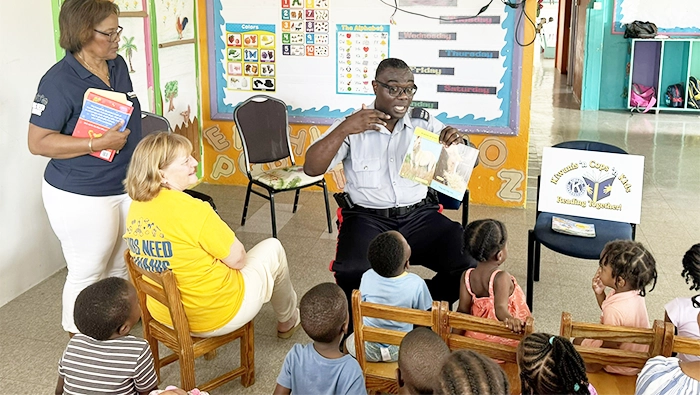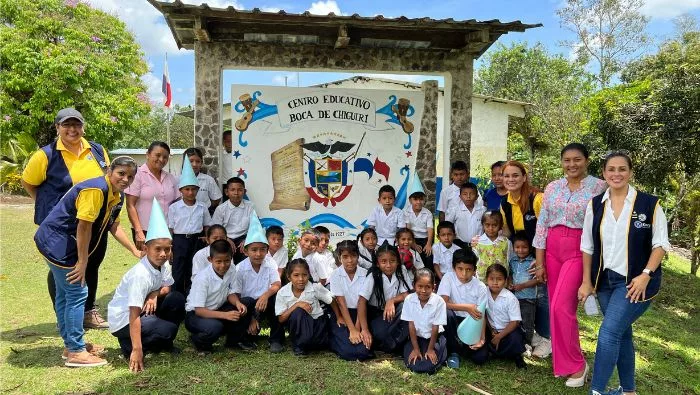
Kiwanis club program connects kids, cops and books
In Barbados, a literacy initiative gets its first placement outside the United States.
By Tony Knoderer
Since 2020, Kiwanis clubs in the Wisconsin-Upper Michigan District have been conducting a program that fosters positive relations between children and police officers in their communities — while also promoting literacy among the kids. Started in Appleton, Wisconsin, U.S., in 2020, Kiwanis ’n Cops ’n Kids gives kids access to free books and to reading events that include local law enforcement.
In fact, the program has been growing among clubs throughout the U.S. for the past four years. And with a recent event in Barbados, Kiwanis ’n Cops ’n Kids has expanded outside the U.S. for the first time.
On February 29, Kiwanis leaders Jean Long Manteufel and Delores Lewis joined members of the Kiwanis Club of Barbados Central — along with local law enforcement representatives, employees of the day nursery where the event took place and about 30 children — for the island country’s kickoff event.
One police officer, Constable Shawn Phillips, read to the kids from “Down on the Farm” and National Geographic’s “Ponies,” encouraging the kids to make animal sounds as he turned the pages.
The event was an important milestone for Manteufel, who started the program in 2020-21, when she was the governor of the Wisconsin-Upper Michigan District. That’s also when she met Lewis, who became governor of the Eastern Canada and the Caribbean District that year.
“Delores was in my governor’s class, which is how we became friends,” Manteufel says. “When my husband and I planned a trip to Barbados, I asked her if they would be doing any reading projects while we were there. She said yes. I told her about this special program, so we united to launch the program in Barbados.”
Taking the leap
Kiwanis ’n Cops ’n Kids started because Manteufel needed a project as her district’s incoming governor.
“Each year, our governor picks a project that the clubs all contribute to financially, so we can have a big impact,” she says. “But this was during the pandemic. I couldn’t ask clubs to give money when they had all lost their fundraisers and couldn’t even meet.”
Manteufel looked for something both affordable and manageable for clubs of all sizes. Fortunately, she is a longtime friend of LeRoy Butler, a former Green Bay Packer and member of the National Football League Hall of Fame. (He’s also the originator of the “Lambeau Leap” — hence the tribute of scheduling the Barbados event for Leap Day.)
“I also knew that LeRoy was very involved in service to children,” Manteufel says, “so I asked if he had any thoughts. He immediately responded, ‘Cops ’N Kids.’ I learned that LeRoy has a special place in his heart for this program and promotes it whenever he can.”
How it came to Kiwanis
Cops ’N Kids was founded in 1997 by Julia Burney (now Julia Witherspoon), who was then a police officer in Racine, Wisconsin. That year, she responded to a burglary call that led her to a warehouse full of children’s books. She subsequently persuaded the warehouse owner to donate books to share with kids. What started as a program for cops in Racine to distribute books from their cars now consists of 125 reading centers throughout the U.S., as well as Australia, South Africa, Venezuela and the Philippines.
After learning of the program from Butler, Manteufel spoke with Witherspoon and explained her goal of further expanding the program by initiating a version for Kiwanis clubs.
“The next thing I did was reach out to the Appleton police chief in my own town,” Manteufel says. “He loved the idea. He immediately assigned an officer to work with me.”
Manteufel’s own club, the Kiwanis Club of Appleton-Fox Cities, was the first to implement the program. At first, she adds, they did readings online because of the pandemic.
“As soon as things opened up, it was much more successful going to where the kids are — daycare centers, Boys & Girls Clubs, YMCAs and schools,” Manteufel says. “The Appleton Police Department also knew my plan to expand it district-wide and offered to help any PD in the world that wants to participate.”
Manteufel invited Butler and Witherspoon to introduce the program at the Wisconsin-Upper Michigan District’s virtual convention in 2020.
“I had ‘Miss Julia’ as our keynote speaker,” Manteufel says. “People were so moved by her story that in the Zoom chat they all wanted to know how they could help. Then I played my announcement with LeRoy that we had created our own program called Kiwanis ‘n Cops ‘n Kids, and that it was the new governor’s project. The response was fantastic. The attendees took it back to their clubs and since then it has percolated to other clubs.”
After Manteufel’s year as governor, the district voted to continue Kiwanis ’n Cops ’n Kids as its project for the next five years.
How your club can use it
For Kiwanis clubs, Manteufel says, the program is a good fit with service projects and programs where kids are expected to attend — such as pancake breakfasts or parks departments’ summer programs.
Some of the general benefits and advantages:
- Each club does its own version of the program in the community.
- It can be done by clubs of all sizes.
- Clubs can work with Kiwanis International partner Scholastic to get books at a discount.
- Clubs can also use gently used books donated by the community.
“Maybe your club already has a literacy program,” Manteufel says. “By just tweaking it a bit, and inviting police officers to participate, you can give it a new dimension.”
If you’re interested in a Kiwanis ’n Cops ’n Kids program for your community, you can find ideas, contact information and more at the program’s website.


